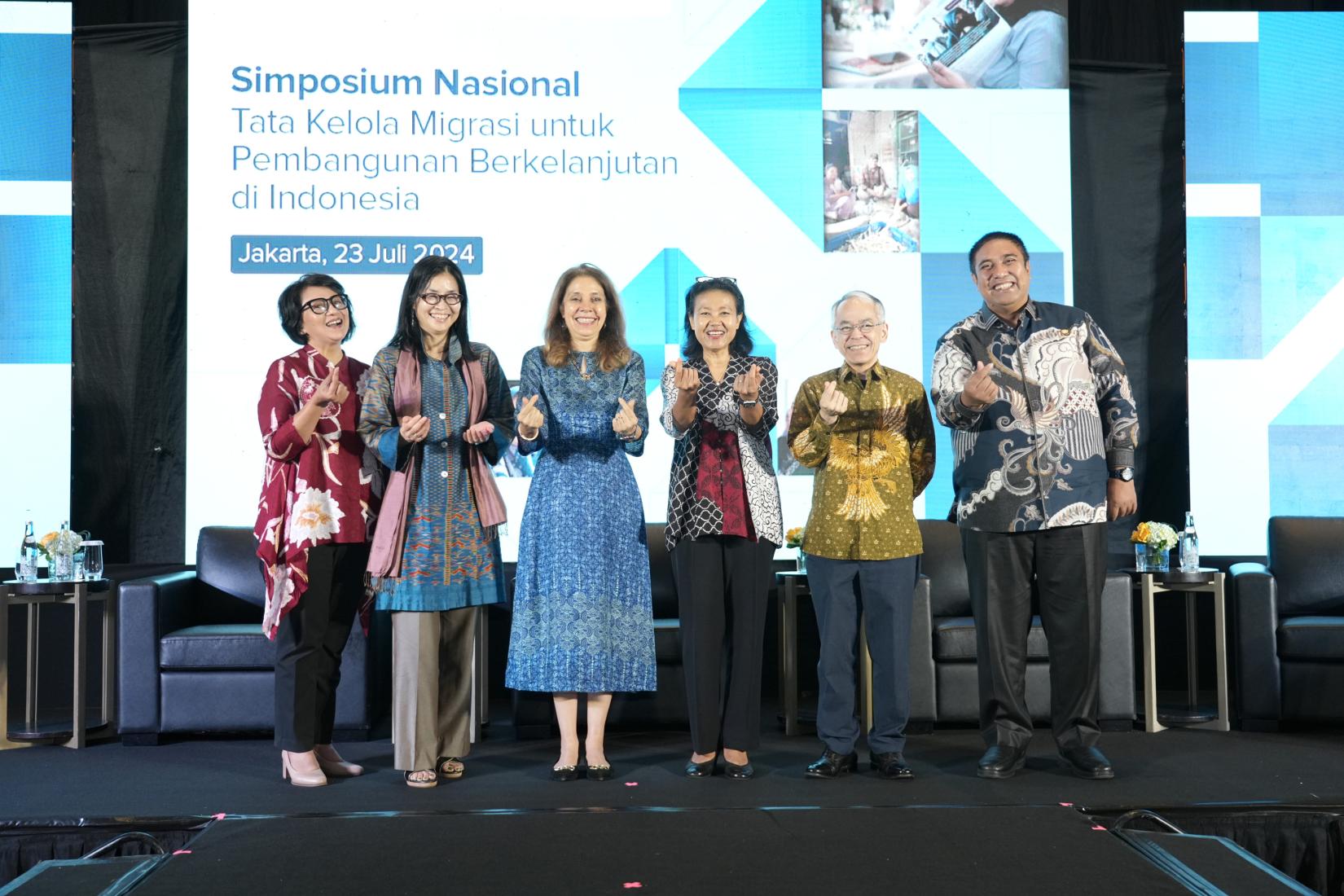Two Years of Progress: Indonesia advances Migration Governance for Sustainable Development
23 July 2024
-----

Jakarta, July 23, 2024 - The Migration Governance for Sustainable Development programme, is hosting a National Symposium to mark the culmination of two years of progress. This collaborative project, involving the Ministry of Foreign Affairs Indonesia, United Nations Development Programme (UNDP), the International Organization for Migration (IOM) and UN Women is supported by the Migration Multi-Partner Trust Fund (MMPTF). This initiative has focused on building the capacity of government officials at both national and sub-national levels. The goal is to s create policies and programmes that are gender-responsive, rights-based, and recognize the potential of migrants as development actors in line with the Global Compact for Safe, Orderly, and Regular Migration (GCM).
The project has achieved three critical outcomes:
1. Strengthened gender-responsive migration governance. The project has developed ten sets of studies, including developing migration governance governance indicators, targeted training sessions, and facilitated dialogues on gender-responsive migration at national and local levels. The programme also supports the advancement of protection efforts and strengthening an integrated criminal justice system for women migrant worker victims of gender-based violence and trafficking. The programme also integrated some migration governance into the current draft of RPJMN 2025-2029 that will be adopted later this year.
2. Enhanced capacity of government at sub-national level. By promoting localized training, the project has provided essential tools for local governments, including three provinces, and five cities/regencies to integrate migration into planning and budgeting and increased capacity of more than 3,000 stakeholders to prevent and respond to violence and trafficking. This is to ensure that all government stakeholders can effectively manage and leverage migration for development.
3. Promoting innovative sustainable financing. This project has developed and tested three innovative financing initiatives and gender-responsive economic empowerment to support migrant workers to empower their economic capacity.
Director for Socio-Cultural Affairs and International Organization of Developing Countries Ministry of Foreign Affairs, Penny Herasati, said:
"Migration is a choice, driven by an individual's need to improve capacity and well-being. For those who choose to migrate, adequate skills and knowledge are a must. The government always strives to strengthen cross-sectoral coordination in strengthening migration governance, including through training and socialisation, so that Indonesian citizens migrate through well-managed procedures."
“GCM encourages each country to strengthen migration regulations and procedures, including strengthening the protection of migrants' rights and preventing violence and trafficking. The cooperation to strengthen migration governance between the Indonesian Government and UN agencies in Indonesia is one of the good practices of UN efforts to support Indonesia's capacity building. This is very important considering the number of Indonesian citizens abroad and the increasing trend of migration in Indonesia."
Resident Coordinator United Nations in Indonesia, Gita Sabharwal said, “As we move forward, it is crucial that we build on these achievements, and ensure that migration policies and practices evolve to meet new challenges. The National Symposium is a great opportunity for us to reinforce Indonesia’s position as a champion country for the GCM in support of migration governance.”
The state of migration in Indonesia
Migration often becomes the only viable option for Indonesians with limited or no opportunities at home. In 2023, the number of Indonesians working abroad surged by 36.95% from the previous year, with a significant proportion being women, working in informal sectors
However, these opportunities come with substantial risks, including irregular placement, gender-based violence, trafficking in persons, fraud, and exploitative working conditions. To address these issues, the Indonesian government has adopted the GCM, aiming to maximize the benefits of migration while ensuring the end-to-end protection of Indonesian migrant workers. The GCM emphasizes effective migration governance and aligns with SDG target 10.7, which focuses on “facilitating orderly, safe, regular and responsible migration.”
Therefore, the Migration Governance for Sustainable Development project has been pivotal in enhancing shaping the future of migration governance in Indonesia.
Innovation for Migration
Aside from the establishment of sustainable financing mechanism, later on, the project will officially launch two innovations namely (1) The Chat Bot feature, which an additional feature to complement the existing safe travel app that allowing quick access for women migrant worker victims of violence to seek help (2) Juang Mobile Application, which a financial management app to help migrants manage their expenses effectively that will benefits more than 3 million Indonesian migrants in estimation.
-end-
About UN in Indonesia
The UN in Indonesia is committed to supporting the Government of Indonesia's development efforts based on the Sustainable Development Goals (SDGs) focusing on four strategic priorities aligned to the countries national medium term development plan. These include (i) inclusive human development, (ii) green development, climate change and natural disasters, (iii) economic and digital transformation, and (iv) innovation to accelerate SDGs. The United Nations Country Team consists of 26 UN agencies, funds, and programmes working in close partnership with Government, private sector, academia, and civil society providing integrated policy advice and technical assistance strategically aligned to the SDGs. In 2023, UN in Indonesia total delivery exceeded US$ 110 million.







